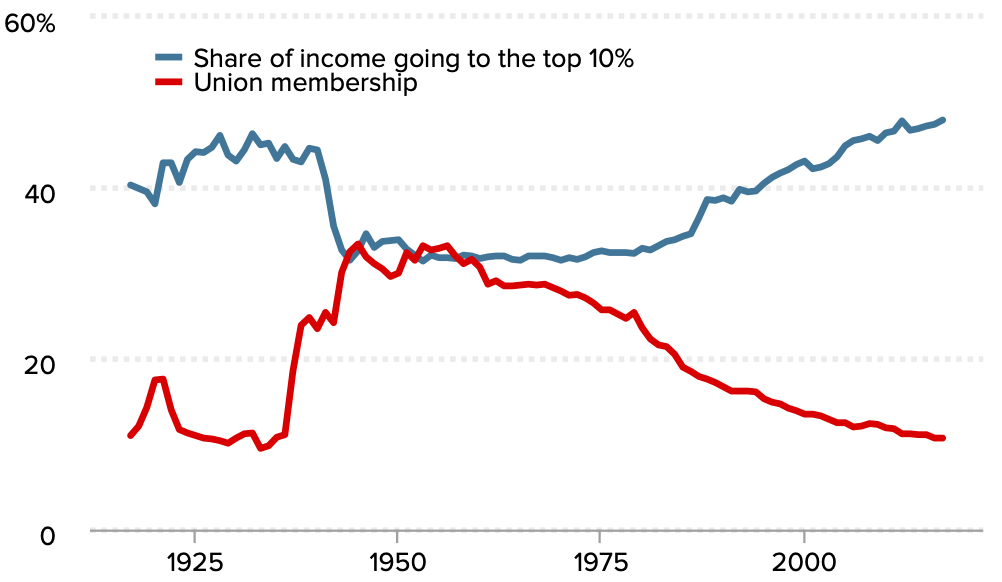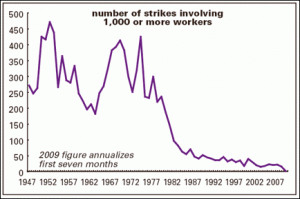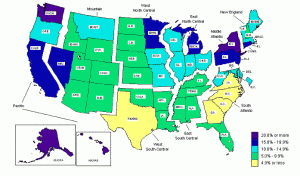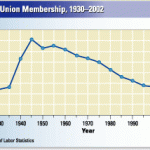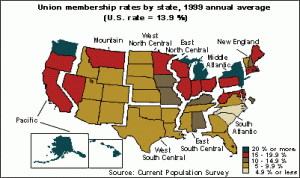
union membership by state map
Given that it’s Labor Day weekend let’s chat about labor—organized labor. This post from 2007 is still relevant. If you take a look at the map on your left something may jump out at you, as it did me. Where Labor is strong – Democrats tend to win. Where Labor is weak, they don’t. In the last election the electorate split fairly evenly, but amongst the groups that stand out as having gone Democratic, one is Labor. The general election was 49/49, but union members went 64/36 Democratic/Republican.
But it isn’t just about union members voting for Dems – that’d just make unions an identity group. As Matt Stoller pointed out back in 05 Unions actively help Democratic candidates. They give money, and they give it early. They do field and GOTV, and indeed, they probably have the best field organizations in America. Kerry ate Dean’s lunch in large part because of the International Association of Fire Fighter’s (IAFF) organizers out organizing (sometimes rather brutally) the Dean machine. (More on the IAFF and their endorsement of Dodd this time around later in the article).
Unions provide organizing space, they provide media surrogates, they conduct training, they support think tanks and so on. They provide a lot of the infrastructure that keeps the party going – and that pushes the party to pursue liberal and populist policies when in office.
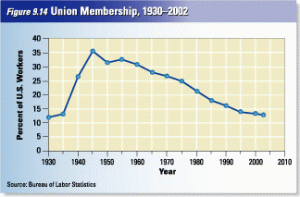
historical union membership
As union membership has declined, so have Democratic electoral results. This isn’t an accident and it isn’t something that Republicans want to see stop. Unions have been under constant assault for decades – starting with Taft-Hartley in 47 (a bill Truman, his veto overruled, called a “slave labor bill”.) Recently, and egregiously, the NLRB has moved to classify nurses as supervisory workers, which would make most of them unable to be union members and basically de-unionize hospitals. (This is a loophole from Taft-Hartley, which made supervisory workers ineligible for unionization as a way of destroying the extremely powerful foreman’s unions that existed at the time.)
Democrats have often disrespected unions, even while paying them court. NAFTA was pushed through by Bill Clinton even though labor was largely against it. Indeed, I have been told that the unions went to Clinton and said “we have a war chest of many millions. We can spend it fighting NAFTA or pushing for universal health care. Your choice.” Clinton choice NAFTA over universal health care. Time and time again so-called free trade bills (which are usually more about free flow of money, than of trade, in any case) have been pushed over the objections of labor.
Meanwhile, the presumptive next nominee, Hilary Clinton, has as her chief strategist, Mark Penn, the CEO of Burson-Marsteller, a PR firm which is noted for its vicious anti-unionization campaigns. After receiving some complaints, Penn’s response? To stop doing anti-union work, which he claimed he’d never been doing in the first place (just getting the paychecks for). Did he tell his firm to stop doing anti-union work? No. Did Clinton demote him or get rid of him? No.
But, then, why should the Clinton campaign care what labor thinks? Sure, they complained, but when neither Penn nor Clinton really did anything to deal with the underlying problem (he’s the BOSS, and he should either make the anti-union work stop entirely, or if he can’t, quit the firm, if he doesn’t believe in it), labor really did nothing.
And in most cases, that’s labor’s pattern. They, like many Democratic constituencies, seem to be suffering from a certain learned helplessness. Take the IAFF, whom I promised to come back to. They endorsed Dodd last week. Now there are two possibilities here – one is that they are endorsing Dodd just based on his stellar record of getting behind their concerns. Hey, they backed Kerry when he was at his lowest (but remember that before that he had been the presumptive front-runner, a status Dodd has never had). The less charitable possibility was suggested in a Steve Clemons post:
My theory [on the Dodd endorsement]? It’s a case of the Althusserian “absent center” with Dodd as the donut hole.
The Firefighters don’t want to make the “wrong” choice between the three candidate that can win — Clinton, Obama, and Edwards.
They like Edwards like the rest of the movement but don’t think he’s going to win, and don’t want to piss off the Hillary machine. But they also don’t want to seem paralyzed and ineffectual. They want to be players. So they pseudo-aggressively endorse someone, but don’t piss off any of the big three by picking one of them against the other two.
After Dodd drops out following Iowa or New Hampshire, they see the lay of the land and jump to the likely winner.
I’m wondering how many endorsements by the unions we’re going to see for Edwards. Of the front-runners Edwards has the most union-friendly campaign and has promised the most union friendly policies. He’s been working hard for their support since the end of the last campaign. More to the point, to win, Edwards pretty much requires union support. Edwards’ strategy has always clearly been to do well in the early states and to get the union endorsements to supplement his ground machine, since he is well aware (having witnessed it personally in ‘04) that they have the best ground machine available.
If unions really are frightened of the Hilary machine holding grudges in 09 if they win, and unions won’t endors another viable candidate as a result, then the unions have made themselves into political eunuchs. If they won’t play, they don’t need to be taken into account. Hilary will throw them the occasional bone, sure, but is unlikely, as was Bill, to pursue policies that will do more than slow the long-term decline in union membership (look at the graph above and see how unions did under Bill). And unions need a reversal of that trend, not just a few years of slower bleeding, or even a halt.
Meanwhile the deeper reason that unions don’t get the respect they should in Democratic circles (and by “should” I mean on totally pragmatic “they make us win” terms) is probably because unions get little respect from white collar workers. Two episodes stand out for me on this – the first was that long period the 90’s where techies used to disrespect unions and resist unionization because they were being paid so well because “they were smart, and, like, knowledge workers” and therefore didn’t need unions. What they didn’t realize, because everyone who gets paid well always wants to think its because they, personally, are so wonderful, is that it was just a tight labor market for people with specific skills and that as soon as that skill set became common enough, the gravy train would stall. Sure enough, in the 00’s techies took it on the chin, and companies outsourced and offshored as much of their technical functions as they could. Suddenly a Bachelors in Comp.Sci wasn’t a ticket to the gravy train any more. Techies had made the classic error of attributing to themselves (genius knowledge workers who are each individually unique flowers with a skill set that can’t easily be replicated) what was a property of the situation (new technology, moving fast, not enough early adopters with the necessary technical skill set, therefore a labor crunch in the field).
And then, of course, there was the New York City Transit Strike – and the comments, I, as a blogger defending them, received from my commenters about how they should just be grateful to have decent jobs, shut up and go back to work, because my readers didn’t have half the benefits those blue-collar transit workers did and they didn’t deserve them anyway. No one seemed to make the connection that if the transit workers were costing the economy billions of dollars every day, then the economic value of what the transit workers did must be, ummm, rather larger than they were being compensated for. What was revealed then was a lot of ugly class hatred and envy – people with BA’s who felt that if they weren’t making it, neither should be blue collar workers without a degree. Fortunately, the majority of citizens of NYC actually backed the union (despite a full court press offensive against the union) and things worked out reasonably well.
But this middle class contempt for unions, and for the sort of people that make them up, boils up so frequently that I’ve come to believe it’s a deep malaise in the American middle class psyche. I’m not entirely sure why it exists, other than as manifestation of the very human emotion of envy, but it definitely exists. And as the middle and upper classes (who never liked unions to begin with) have become the powers in the Democratic party (try and get started in politics and you will quickly find that the easy route – internships – is mostly only available to you if mommy and daddy can afford to support you while you work for nothing) a fundamental misunderstanding, and often, outright contempt, for working people has taken hold (again, at the end of the day… remember all those “free” trade bills, passed by Democrats despite Labor’s strenuous objections).
Where unions are strong, Democrats win. But Democrats seem to have forgotten that at a very fundamental level and have allowed unions to sicken till they are but a pale shadow of what they once were. If Democrats want to win, they need to rectify that. If unions want their strength back, they need to hold Democrats to policies that aid unions, knowing that in so doing they are serving both sides. And the middle and upper classes that run the Democratic party need to get over their disdain for unions and recognize who their real friends are – even if only for hard-headed pragmatic reasons. There will be no new permanent Democratic majority like the one that ruled most of the post-war period, until the unions recover.
So this Labor Day Weekend I wish Labor nothing but the best. May a thousand unions certify and in so doing may Democrats sweep into office across the land.
Read More
